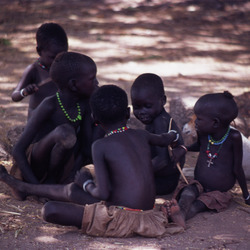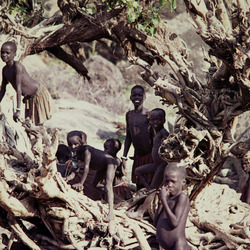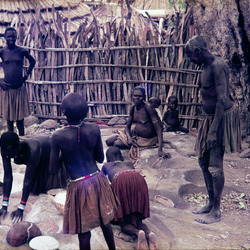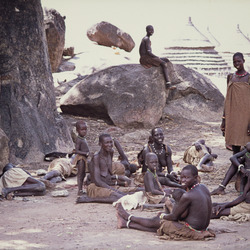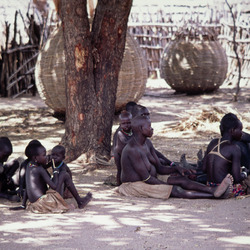Age sets part II 18
When the girls get older, they look for their own meeting place where they sleep and talk. One girls’ age group may choose a certain tree as their meeting place. Another age group may approach a friendly, easy-going grandmother and hang out as an age group at her place. It is an honor for the grandmother, as the group might occasionally do work for her - cultivating a field of vegetables, grinding flour, cooking, or other such jobs.
Female ‘lange’ are less formally organized compared to the male groups, but still function as important units for work and for social events as well as friendship.
When married, a woman continues to socialize, drink beer and dance with the agemates of her ‘lange’. If she later moves to her in-laws, she may occasionally come together with the other wives of her husband’s ‘lange’, but she will still spend time now and then with her girlfriends from her youth.
Every evening, groups of boys and men walk around in the village and seek food from the wives, mothers, or sisters who have been cooking. If the age group of a village is not large, they all walk and eat together. In villages with larger age groups, they divide the group in two or more ‘eating units’, ‘wiagwata’, of about 10 – 15 people. Only a few bites are consumed at each compound before they walk on. If there is no food, they may have a sip of beer, or seek beer at another compound after the meal.
‘Wiagwata’ recruits from all age levels within an age group. The whole age group, or the ‘wiagwata’ only, can be mobilized as a unit for work, often paid with a beer party.
Eating together once or twice a day, sleeping on the same platform, and working and hanging out together binds the groups into strong units. Occasionally they meet with their parallel age groups from the other villages.
Case: A boy living with his mother and her brothers in the village Bura, who was a member of his father’s village Wiatwo, invited his agemates in Bura for beer at his mother’s house. When his agemates in Wiatwo heard about this, they got upset and claimed that they should get the beer, because he was a member of their age group. The Wiatwo agegroup complained to their ‘mojomijis’ (warriors) who started a quarrel with the ‘mojomijis’ of Bura. A fight with sticks broke out and some members were badly wounded. The boy who had lived his whole life with his agemates and friends in Bura was expected to fight on the side of Wiatwo - otherwise he could be fined by the Wiatwo.
Such cross-pressure situations would most often lead to passivity or active resistance to the fighting.
Peacemaking is an important implication of the crossing loyalties persons have to age group and to lineages.

